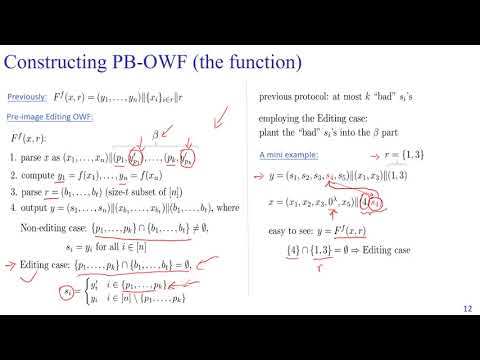CryptoDB
Towards a Unified Approach to Black-Box Constructions of Zero-Knowledge Proofs
| Authors: |
|
|---|---|
| Download: |
|
| Presentation: | Slides |
| Conference: | CRYPTO 2021 |
| Abstract: | General-purpose zero-knowledge proofs for all $\NP$ languages greatly simplify secure protocol design. However, they inherently require the code of the underlying relation. If the relation contains black-box calls to a cryptographic function, the code of that function must be known to use the ZK proof, even if both the relation and the proof require only black-box access to the function. Rosulek (Crypto'12) shows that non-trivial proofs for even simple statements, such as membership in the range of a one-way function, require non-black-box access. We propose an alternative approach to bypass Rosulek's impossibility result. Instead of asking for a ZK proof directly for the given one-way function $f$, we seek to construct a {\em new} one-way function $F$ given only black-box access to $f$, {\em and} an associated ZK protocol for proving non-trivial statements, such as range membership, over its output. We say that $F$, along with its proof system, is a {\em proof-based} one-way function. We similarly define proof-based versions of other primitives, specifically pseudo-random generators and collision-resistant hash functions. We show how to construct proof-based versions of each of the primitives mentioned above from their ordinary counterparts under mild but necessary restrictions over the input. More specifically, \begin{itemize} \item We first show that if the prover entirely chooses the input, then proof-based pseudo-random generators cannot be constructed from ordinary ones in a black-box manner, thus establishing that some restrictions over the input are necessary. \item We next present black-box constructions handling inputs of the form $(x,r)$ where $r$ is chosen uniformly by the verifier. This is similar to the restrictions in the widely used Goldreich-Levin theorem. The associated ZK proofs support range membership over the output as well as arbitrary predicates over prefixes of the input. \end{itemize} Our results open up the possibility that general-purpose ZK proofs for relations that require black-box access to the primitives above may be possible in the future without violating their black-box nature by instantiating them using proof-based primitives instead of ordinary ones. |
Video from CRYPTO 2021
BibTeX
@inproceedings{crypto-2021-31131,
title={Towards a Unified Approach to Black-Box Constructions of Zero-Knowledge Proofs},
publisher={Springer-Verlag},
doi={10.1007/978-3-030-84259-8_2},
author={Xiao Liang and Omkant Pandey},
year=2021
}

